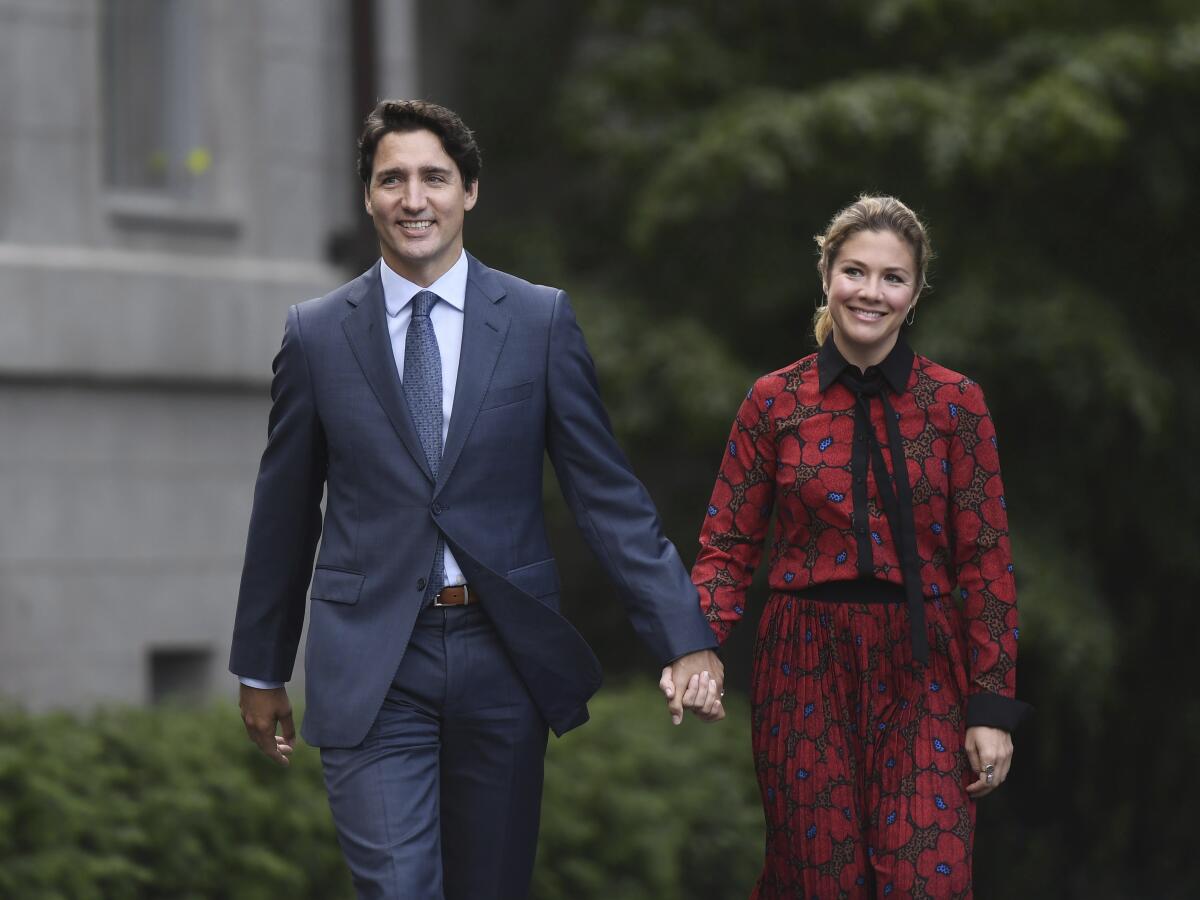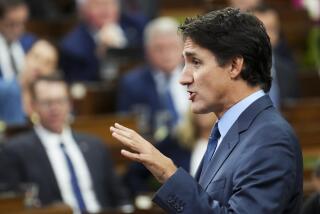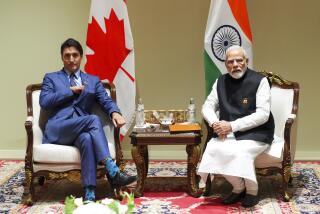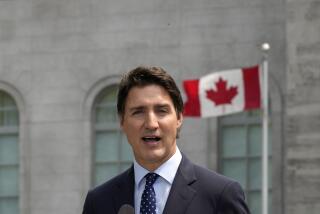Canada stops dithering after coronavirus sickens Trudeau’s wife

MONTREAL — The Sophie Effect is a powerful thing.
For days, as the coronavirus swept across North America, Canada dithered. It took comfort in small virus numbers. Universities watched their sister institutions in the United States prepare for remote learning but made scant preparations themselves. Prime Minister Justin Trudeau addressed the issue in a laconic way, suggesting everything would be OK.
Then came the report that Sophie Grégoire Trudeau, the prime minister’s wife, had contracted the virus.
Suddenly — in a matter of hours — the phrase “social distancing” came into vogue. Schools announced closures. Gyms emptied out. Antibacterial wipes were hard to find. Canadians crowded into grocery stores. Green bananas instantly acquired special value.
Amid the building chaos there was only one uplifting development: In a country with vast forest resources, the largest producer of toilet paper announced that there is plenty of Cashmere and Purex available.
Nothing changed the tone and timbre of Canada’s response like the Grégoire Trudeau announcement, which in an instant cleared away what the writer Conrad Black, in his landmark 2014 history of this country, described as the “vintage Canadian genius for cooling things out through endless palaver and intricate formalities.”
The morning after the news about Grégoire Trudeau spread even more quickly than the virus itself, the Super C grocery store in Montreal was so mobbed that the line to check out crowded carts wrapped around the side and back walls of the store. The result was a complete absence of carts in the parking lot and store foyer. A man unloading a cart stuffed with produce and staples had two words for a shopper who waited to take his emptied cart: “Bonne chance,” French for “Good luck.”
The prime minister — himself voluntarily remaining away from public appearances for two weeks — held a lengthy news conference Friday morning and said he had “absolutely no symptoms.” He asserted that he would not be tested and added that he did not believe he was a “vector” of the disease but acknowledged that his wife’s condition — her case is described as “mild” — focused attention on the threat.
“When the most prominent and visible persons in society fall sick — when the epidemic reaches into the ‘first family,’ whether in a republic or a democratic monarchy — then everyone feels more vulnerable than they had before,” said Jason M. Opal, a McGill University professor who is writing a history of epidemic diseases in the United States with his father, Steven M. Opal, a clinical professor of medicine at Brown. “The general sentiment is, ‘If it could hit them, it could hit anyone.’ That touches the body politics in a way that mere figures of new cases never can.”
The same phenomenon occurred when President Eisenhower suffered a heart attack while on a working holiday in 1955, the gravest health crisis any president experienced since Woodrow Wilson’s 1919 stroke, which left the 28th president largely incapacitated for the remainder of his term. Until Eisenhower was hospitalized, the notion that cholesterol and saturated fats could cause heart disease was not broadly understood.
“The administration’s handling of Ike’s heart attack brought useful attention to heart disease, thanks to periodic public briefings by renowned Boston cardiologist Paul Dudley White and intense media interest in this subject,” said Michael J. Birkner, a Gettysburg College historian who has written widely on Eisenhower.
Amid the flurry of activity promoted by the Grégoire Trudeau disclosure, new, climbing figures of virus cases have been released, now reaching around 170 cases. The government closed the House of Commons until April 20. The provinces of Ontario, Quebec, Alberta and British Columbia restricted public gatherings of more than 250 people. Ontario extended its school break by two weeks. Trudeau discouraged foreign travel.
Religious leaders, mindful that the crisis has created fresh need for spiritual comfort, grappled with how to maintain safety while ministering to their congregants. Rabbi Lisa J. Grushcow of Temple Emanu-El-Beth Sholom here in Montreal moved Sabbath services to a larger sanctuary to permit worshipers to spread out and mobilized to live-stream the proceedings.
For weeks, Canada seemed to be repeating its experience from the 2008-09 financial crisis, when distress mounted across the globe but left this country relatively unscathed. Recent days have dispelled that hope. In his remarks flanked by a white picket fence at Ottawa’s Rideau Cottage, where the Trudeaus are living while the official 24 Sussex Drive residence is being restored, the prime minister asserted that Canada was “in the enviable position of hiving significant fiscal firepower available to support you.”
In the days ahead, Trudeau plans to propose a fiscal stimulus of roughly U.S. $14.4 billion, about 1% of the country’s gross domestic product.
The prime minister has said he is not distracted while, as he put it, “I am in isolation and my wife is in quarantine.”
More than a century ago, two American presidents were distracted from their duties because of their wives’ illnesses. President Wilson was preoccupied with the health of Edith Axson Wilson, who eventually died of Bright’s disease in 1914, the second year of his first term. White House events were repeatedly interrupted nearly two decades earlier as President McKinley attended to the epilepsy and repeated bouts of anxiety of his wife, Ida Saxton McKinley.
“It was a big intrusion on McKinley’s presidency because she was so demanding and sometimes quite peevish,” said Robert W. Merry, author of a 2017 biography.
Trudeau seemed determined to avoid that situation. He spoke with President Trump on Thursday and with French President Emmanuel Macron on Friday, and held a conference call with provincial premiers and Indigenous leaders before meeting with reporters at the noon hour. He emphasized a coordinated effort, including public participation. “Addressing COVID-19 must be a Team Canada effort.”
Meanwhile, the prime minister was confronting another domestic challenge: keeping his wife and three children, ages 3 to 6, occupied in isolation. “My kids have been doing LEGO,” he said, “and my wife has been on the phone to friends and family.”
Shribman is a special correspondent.
More to Read
Sign up for Essential California
The most important California stories and recommendations in your inbox every morning.
You may occasionally receive promotional content from the Los Angeles Times.










